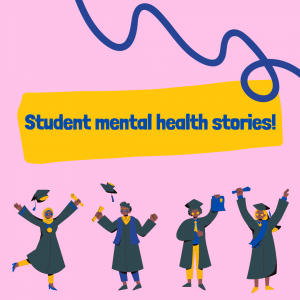This week we’re continuing our series on student mental health, inspired by the Think Positive Hub, a website designed by NUS and Mind Waves. The online hub brings all of the projects, services, resources and news relating to student mental health together in one place, for students and those who support them, to easily access. Read on for Ellen’s story
I graduated from the University of Glasgow in the summer of 2021 with joint honours in History and Politics. I always knew I wanted to study those subjects because I have a personal interest in human rights and current affairs. I enjoyed my degree greatly and found the workload manageable for the most part. However, my third and fourth years of study were made difficult by the pandemic. I had to move home in the Spring of 2020 and found studying at home to be very difficult. My dissertation involved a lot of in-depth archival research which was not accessible to me from home. My main struggle throughout my degree, however, was my need for academic validation, which started in school because I set myself unrealistically high standards which I then struggled to maintain when I moved to university.
I originally applied to Edinburgh University and did everything I could to be accepted. I was head girl, I played violin to a high standard as well as partaking in numerous other extra-curricular activities. Looking back, I see that I put pressure on myself to excel academically at the expense of having a rewarding social life and giving myself time to relax. When I didn’t get into Edinburgh, I was upset and confused. Now I can see that going to UofG was the best decision for me, and, although I would like to say that this setback helped me re-assess my priorities, it did not.
I found it easy to make to friends with likeminded students, and, found it easier to balance social activities with studying, but I was still emotionally attached to academic validation, and the better I did in essays and exams, the better I felt about myself. During the pandemic, I was forced to re-evaluate my level of expectation for academic success because of the lack of resources available to me. Another issue was that living away from university isolated me from my social support network and caused me to burn myself out working with no social outlet.
I became stressed about my predicted grade for my dissertation and knew that my marker was harsh. During this time, I remember feeling hopeless and a sense of unfairness that I was expected to complete this huge project on my own without the material I needed. My mental health was poor due to my own struggles with anxiety, and I think I projected these feelings onto my academic standing. I felt like my self-worth was entirely dependent on good marks and a first-class degree.
Looking back on this time, a year after graduation, I can see that I was indulging in unhealthy behaviours. I achieved a high grade in my dissertation, and graduated with the first that I wanted, but this did not bring me the level of pride and happiness that I thought. These negative feelings around academia caused me to change my career path post-graduation. I always thought I would move straight into postgraduate study, and maybe even pursue a long-term career in academia. After thinking about this deeply and being lucky enough to have some CBT therapy on the NHS – which was really helpful – I decided to take a year away from studying and I got a job in in financial technology and customer service. Although this isn’t a job that I can see myself doing forever, I think it was very beneficial for me to take a break from my need for academic validation and learn a new skill whilst trying to achieve a healthier work, life balance. In the space of a year, I went from living at home with essentially no independence to living alone in the city, supporting myself and earning my own living. My parents have always been supportive of me, no matter what I do and how much I achieve, and they helped me realise that I should prioritise my own happiness over high grades.
University was a bubble, I felt like I was surrounded by smart hard-working people who prioritised academic success over almost everything else. Graduating popped that bubble and allowed me to view my future as someone who was not defined by academic praise. The circles I ran in during my degree prevented me from seeing how meaningless individual grades are. Since I left, nobody has ever asked me what I got in my degree, and the skills I use in my everyday job are ones that I didn’t learn at uni, and although I don’t regret my degree, I wish that I had let myself enjoy it more and appreciate the learning as opposed to a grade on a piece of paper.
So there you have it! Ellen’s student mental health story. We’re very grateful to her for speaking about her student experience so candidly, and we would love to keep sharing these stories. Get in touch with me at maddy@mindwavesnews.com if you have an idea for a blog post. You can also keep up with Ellen, one of our community correspondents, at her Instagram @ellen_hart



No comments yet.